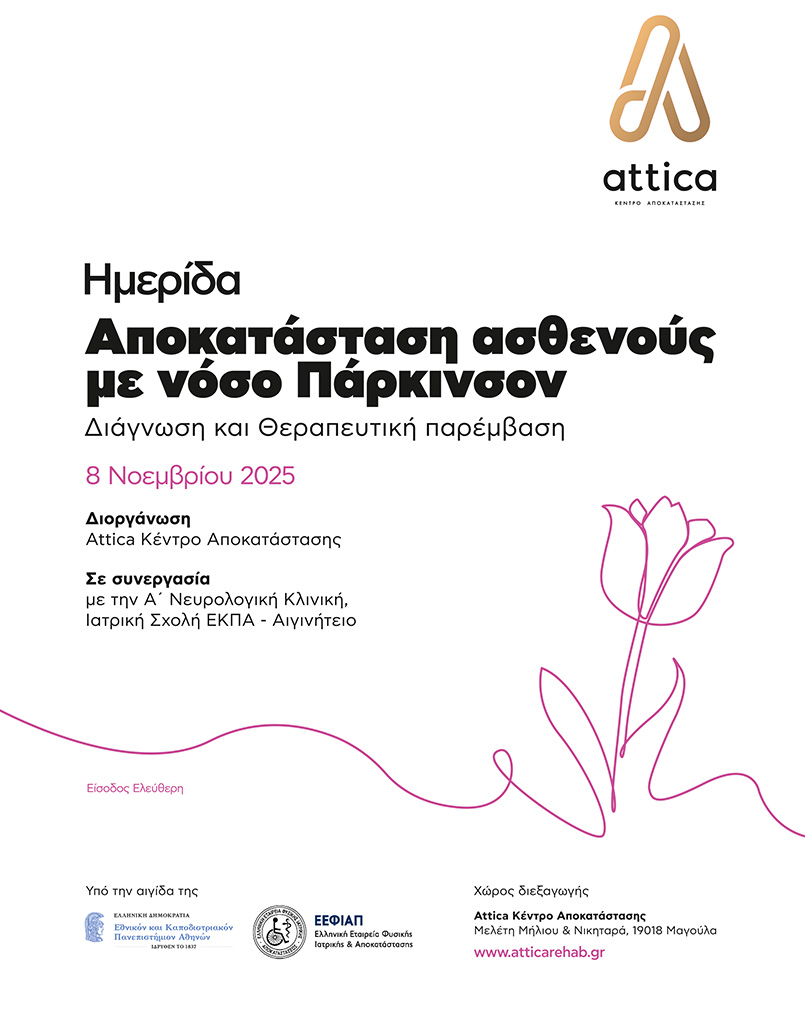The KAA Attica Team by the Patient’s Side
The transition from hospitalization to the Rehabilitation Center to the reintegration of the patient into their daily life is a significant step. The KAA Attica team is by the patient and their family, offering support and guidance to ensure that the necessary steps are taken safely and effectively, ensuring both the patient’s smooth adaptation and boosting the caregivers’ confidence.
1.Transition Planning
Evaluation by a Rehabilitation Physician:
- Evaluation of the patient and provision of necessary discharge instructions.
- Compliance with medication.
- Evaluation of functionality and prescription of a specific daily self-rehabilitation program (e.g., 10 activities for the use of the affected upper limb or safe functional walking).
- Intermittent catheterizations (instructions to the patient and caregiver at regular intervals).
- Planning of electronic consultation (e-consultation) one month after transitioning home and at regular intervals.
- Monitoring of spasticity before or after botulinum toxin injection (only for rural areas).
- Cooperation with local therapists, health centers, or personal doctors for ongoing guidance.
2.Support and Therapy before Transition
Evaluation by a Physical Therapist:
- Presentation of Autotherapy exercises that the patient can perform independently or with caregiver assistance.
- Training in transfers (from bed to chair, wheelchair, etc.).
- Training in proper walking patterns, with or without assistance.
- Training in stair climbing.
- Training in toilet use (proper technique, use of aids).
- Training in Activities of Daily Living (ADL).
- Written instructions & videos with exercises for home.
Evaluation by a Speech Therapist:
- Provision of feeding instructions.
- Leaflet with food composition recommendations for dysphagia cases.
- Communication support material (e.g., communication board).
- Possibility of re-evaluation via Zoom.
Dietary Plan by a Dietician:
- Personalized diet plan tailored to the patient’s needs.
- Nutritional education and counseling.
- Re-evaluation after 15 days.
Evaluation by a Social Worker:
- Support for access to social services and resources.
- List of medical equipment and assistive device companies.
- List of organizations offering free psychological support.
- Facilitation of communication with social services and organizations.
Evaluation by an Occupational Therapist:
- Assessment of daily functionality and home adaptation (ideally with a site visit or via photographs).
- Detailed list of assistive devices to aid the patient.
- Caregiver training on the use of assistive devices and supportive technology.
- Training in techniques for facilitating daily life activities (transfers, toilet use).
- Creation of a personalized therapy protocol to enhance self-care and autonomy.
- Instructions for the safe use of walking aids or wheelchairs outdoors.
- Participation in the process of selecting a wheelchair in collaboration with a professional in assistive technology.
Evaluation by a Psychologist:
- Counseling session (60 minutes) with the family/caregivers to prepare for the transition.
- Management of emotional distress.
- Strengthening communication and family relationships.
- Follow-up session one month after returning home (in-person or via Zoom).
2. Support and Therapy before Transition
Evaluation by a Physical Therapist:
- Presentation of Autotherapy exercises that the patient can perform independently or with caregiver assistance.
- Training in transfers (from bed to chair, wheelchair, etc.).
- Training in proper walking patterns, with or without assistance.
- Training in stair climbing.
- Training in toilet use (proper technique, use of aids).
- Training in Activities of Daily Living (ADL).
- Written instructions & videos with exercises for home.
Evaluation by a Speech Therapist:
- Provision of feeding instructions.
- Leaflet with food composition recommendations for dysphagia cases.
- Communication support material (e.g., communication board).
- Possibility of re-evaluation via Zoom.
Dietary Plan by a Dietician:
- Personalized diet plan tailored to the patient’s needs.
- Nutritional education and counseling.
- Re-evaluation after 15 days.
Evaluation by a Social Worker:
- Support for access to social services and resources.
- List of medical equipment and assistive device companies.
- List of organizations offering free psychological support.
- Facilitation of communication with social services and organizations.
Evaluation by an Occupational Therapist:
- Assessment of daily functionality and home adaptation (ideally with a site visit or via photographs).
- Detailed list of assistive devices to aid the patient.
- Caregiver training on the use of assistive devices and supportive technology.
- Training in techniques for facilitating daily life activities (transfers, toilet use).
- Creation of a personalized therapy protocol to enhance self-care and autonomy.
- Instructions for the safe use of walking aids or wheelchairs outdoors.
- Participation in the process of selecting a wheelchair in collaboration with a professional in assistive technology.
Evaluation by a Psychologist:
- Counseling session (60 minutes) with the family/caregivers to prepare for the transition.
- Management of emotional distress.
- Strengthening communication and family relationships.
- Follow-up session one month after returning home (in-person or via Zoom).
3. Caregiver Training at the KAA Attica Facility
The caregiver stays in an exclusive room with the patient and receives training from the rehabilitation team.
4. Nursing Care
- Hygiene and skin care.
- Positioning in bed (Positioning).
- Training in self-catheterization and hetero-catheterization.
- Collaboration with the local Health Center.
The Transition Program from KAA Attica to Home aims to ensure a smooth transition for the patient from hospitalization to daily life at home, ensuring they receive the necessary support from specialized professionals for optimal rehabilitation and adaptation.




